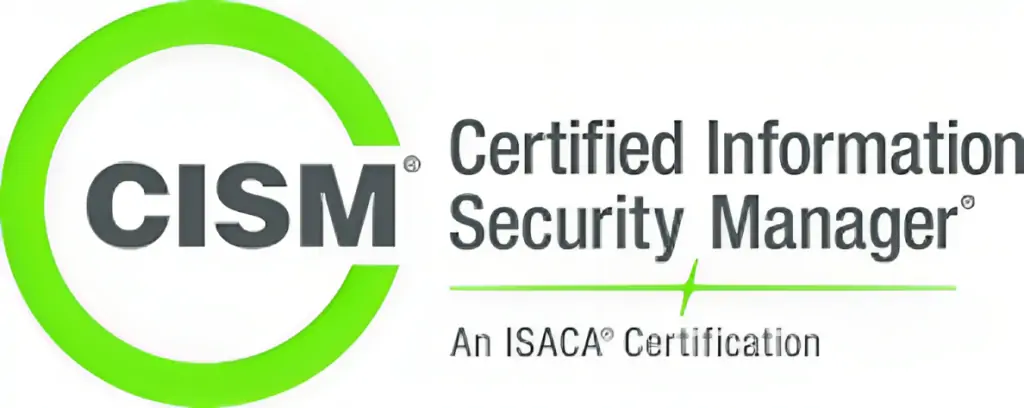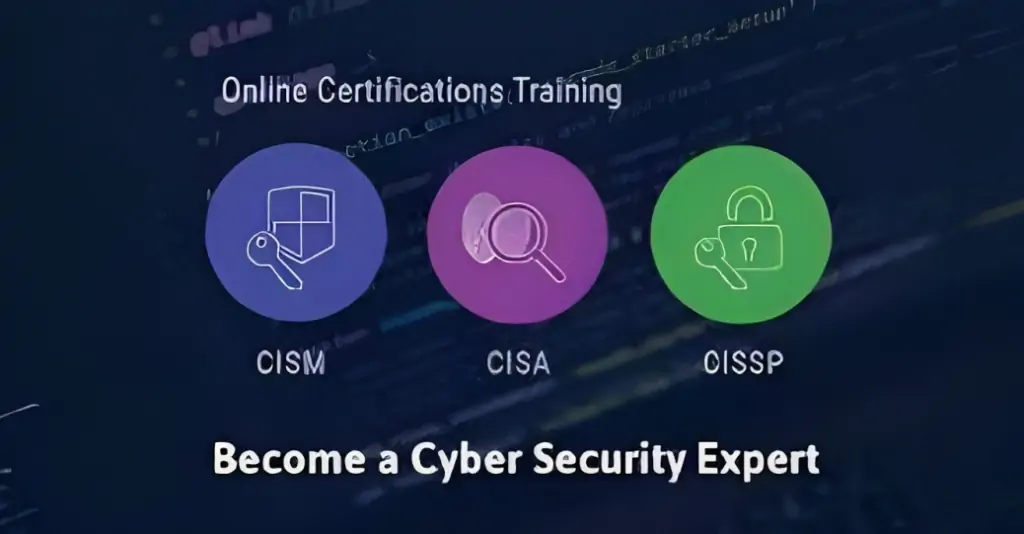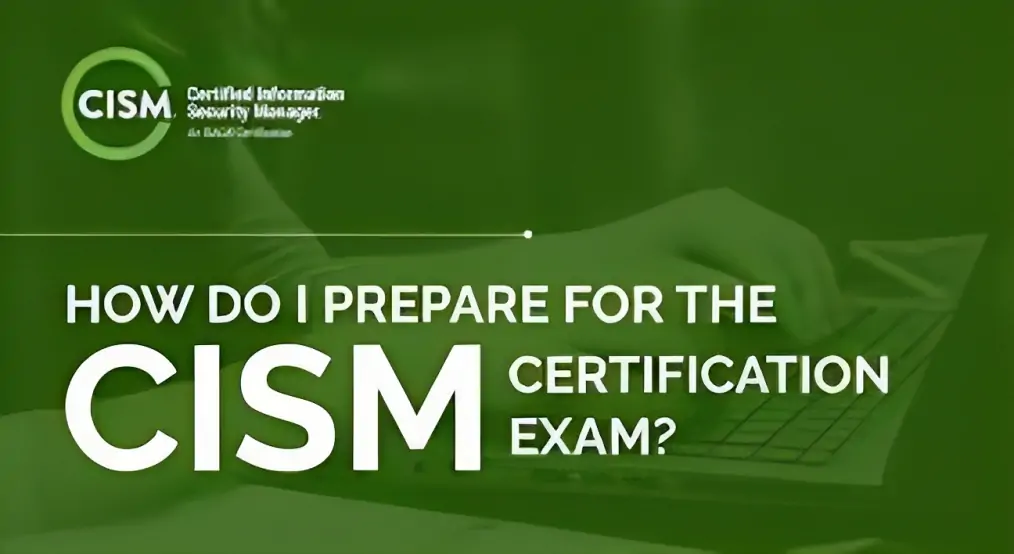Unlock the power of CISM certification. Learn how to lead in cyber security, protect vital data, and enhance your career prospects in the digital age.

Introduction
- In today’s digital age, where information is a valuable asset, protecting it has become a paramount concern for organizations worldwide. With cyber threats evolving at an alarming rate, the demand for skilled information security professionals has never been higher. This is where the Certified Information Security Manager, CISM certification and training come into play.
- If you are looking to advance your career in information security or wish to enhance your organization’s security posture, earning a CISM certification is a wise choice. In this comprehensive guide, we will delve into the world of CISM, exploring what it entails, its benefits, and how you can obtain this prestigious certification. Let’s embark on a journey towards becoming a certified information security manager!
Understanding CISM Certification
What is CISM?
Certified Information Security Manager (CISM) is a globally recognized certification offered by ISACA (Information Systems Audit and Control Association). It is designed for professionals who manage, design, oversee, and assess an enterprise’s information security.
CISM is known for its focus on managing information security programs and aligning them with an organization’s business goals and objectives. This certification equips you with the knowledge and skills needed to navigate the complex landscape of information security.
Why Choose CISM?
-
Global Recognition: CISM is respected worldwide and is often a prerequisite for high-level positions in information security.
-
High Earning Potential: CISM-certified professionals typically earn higher salaries than their non-certified counterparts.
-
Career Advancement: CISM opens doors to leadership and management roles in information security.
-
Stay Current: To maintain the CISM certification, you must earn continuing professional education (CPE) credits, ensuring that you stay up-to-date with the latest developments in the field.
CISM Eligibility Criteria
To be eligible for CISM certification, you must meet the following requirements:
-
Work Experience: A minimum of five years of work experience in information security management. This experience must be gained within a three-year period preceding the exam or within five years of passing the exam.
-
Adherence to the Code of Ethics: You must adhere to ISACA’s Code of Professional Ethics.
-
Passing the CISM Exam: You must pass the CISM exam, which consists of four domains.
CISM Domains
The CISM exam covers four domains:
-
Information Security Governance (24%)
- Establish and maintain an information security governance framework and supporting processes.
- Establish and maintain information security policies, standards, and procedures.
- Ensure alignment between information security and business strategies and goals.
-
Information Risk Management (30%)
- Identify and manage information security risks to achieve business objectives.
- Define and manage the information security risk assessment process.
- Identify and evaluate the organization’s options for mitigating or accepting information security risks.
-
Information Security Program Development and Management (27%)
- Establish and manage the information security program.
- Develop and manage information security policies and procedures.
- Establish and maintain the information security program governance framework and supporting processes.
-
Information Security Incident Management (19%)
- Establish and manage the capability to respond to and recover from information security incidents.
- Establish and manage the information security incident management process.
- Plan and establish the capability to prevent and respond to incidents.
CISM Training Options
Self-Study
Self-study is a viable option for experienced professionals who have a strong foundation in information security. ISACA provides an official CISM Review Manual and other study materials that can help you prepare for the exam. However, self-study requires discipline and commitment, as you’ll need to set your own study schedule and track your progress.

Instructor-Led Training
Many training providers offer instructor-led CISM courses. These courses are typically conducted in a classroom setting or online. They provide structured learning, hands-on exercises, and access to experienced instructors who can clarify doubts and provide guidance. Instructor-led training is an excellent choice if you prefer a more structured and interactive learning environment.
Online CISM Training
Online CISM training is a flexible and popular option for candidates who want to balance their professional and personal commitments with exam preparation. Platforms like BlueMorpho Learning offer comprehensive CISM training programs that include video lectures, practice exams, study materials, and support forums. This type of training allows you to study at your own pace while still benefiting from expert guidance.
CISM Bootcamps
Bootcamps are intensive, short-duration training programs designed to prepare you for the CISM exam in a condensed timeframe. These programs are ideal if you need to prepare quickly or have a firm grasp of the material but want a final review before the exam. However, they are not suitable for those who need a comprehensive introduction to CISM concepts.
Study Groups
Joining or forming a CISM study group can be a highly effective way to prepare for the exam. Study groups allow you to collaborate with fellow candidates, discuss challenging topics, and share resources and study strategies. It can also be motivating to study with peers who are pursuing the same certification.
CISM Exam Preparation Tips:
Create a Study Plan
A well-structured study plan is essential for success in the CISM exam. Define your goals, set a realistic timeline, and allocate dedicated study hours each day or week. Break down the material into manageable sections and track your progress.

Utilize Official Resources
ISACA provides official CISM study materials, including the CISM Review Manual, practice questions, and a glossary. These resources are designed to align with the exam content and can be invaluable for your preparation.
Practice, Practice and Practice
Practice exams are a crucial part of your preparation. They help you become familiar with the exam format and test your knowledge. BlueMorpho Learning and other reputable providers offer practice exams that closely resemble the actual CISM exam.
Stay Updated
Information security is a constantly evolving field. Stay current with the latest industry trends, cyber security news, and updates to the CISM exam content. ISACA’s CISM continuing professional education (CPE) requirements are designed to help you maintain your knowledge.
Join a Supportive Community
Engage with the CISM community through forums, social media groups, or local ISACA chapters. Connecting with others who are preparing for the same exam can provide valuable insights, support, and motivation.
Registering for the CISM Exam
Exam Registration Process
Create an ISACA Account: Start by creating an account on the ISACA website if you haven’t already done so.
Verify Eligibility: Ensure that you meet the CISM eligibility requirements, including the work experience criteria.
Submit the Application: Complete the CISM application, providing details of your work experience and other required information.
Pay the Exam Fee: Pay the CISM exam fee, which varies depending on your ISACA membership status and early registration discounts.
Scheduling the Exam
After your application is approved, you will receive an authorization to schedule (ATS) email from ISACA. This email contains instructions on how to schedule your exam at a Pearson VUE test center or through the online proctored exam option.
Acing the CISM Exam:
Test-Taking Strategies
- Read Carefully: Pay close attention to the wording of each question. Some questions may have subtle nuances that can change the correct answer.
- Eliminate Incorrect Choices: If you’re unsure about an answer, try to eliminate obviously incorrect choices. This increases your odds of selecting the correct one.

- Flag Questions: If you encounter a particularly challenging question, flag it for review and come back to it later. Don’t let one difficult question consume too much of your time.
- Manage Time: Keep an eye on the clock and allocate your time wisely. Don’t spend too much time on any single question.
- Review Your Answers: If time allows, review your answers before submitting the exam. It’s not uncommon to catch mistakes or reconsider your choices during this phase.
Post-Exam
After completing the exam, you will receive a preliminary score report indicating whether you passed or failed. A more detailed score report will be sent to you later. If you pass, congratulations! If not, don’t be discouraged. Many candidates retake the exam after additional preparation.
Maintaining Your CISM Certification
- Once you’ve earned your CISM certification, it’s essential to maintain it. ISACA requires CISM-certified professionals to earn continuing professional education (CPE) credits to stay current in the field of information security. You must earn 120 CPE credits every three-year cycle.
- There are various ways to earn CPE credits, including attending conferences, taking additional training courses, publishing articles or research, and participating in ISACA chapter events. BlueMorpho Learning and other training providers often offer CISM-specific CPE opportunities.
- It’s crucial to keep track of your CPE credits and report them to ISACA to ensure your certification remains active. Failure to meet the CPE requirements could result in the suspension or revocation of your CISM certification.
Career Opportunities with CISM
- Security Auditor: CISM-certified professionals often work as auditors who assess an organization’s information systems, policies, and procedures for compliance with industry standards and regulations.
- Risk Manager: Risk management is a crucial aspect of information security. CISM-certified individuals are equipped to identify, assess, and mitigate information security risks within an organization.
- Chief Information Security Officer (CISO): The CISO is a top executive responsible for an organization’s overall security strategy. CISM certification is often a prerequisite for this prestigious role.
- Security Architect: Security architects design and implement secure systems and networks. Their expertise is vital in ensuring that an organization’s IT infrastructure is resilient against cyber threats.
Benefits of CISM Certification
Enhanced Employability
CISM certification significantly enhances your employability in the competitive field of information security. Employers value CISM-certified professionals for their ability to manage security effectively, making you a desirable candidate for a wide range of positions.
Increased Earning Potential
One of the most appealing aspects of earning a CISM certification is the potential for higher earnings. On average, CISM-certified individuals earn a substantial salary premium compared to non-certified counterparts. Your investment in training and certification can quickly pay off in terms of a more lucrative career.
Global Career Opportunities
Information security knows no boundaries. With a CISM certification, you’ll be prepared to work in various industries and regions worldwide. Your skills will be in demand wherever businesses rely on digital information, offering you a global career path.
Expertise Validation
Obtaining the CISM certification isn’t just about the letters behind your name; it’s a testament to your expertise. It demonstrates that you’ve met stringent standards and have the knowledge and skills to protect an organization’s information assets effectively.
CISM vs. Other Cyber Security Certifications:
While CISM is an excellent choice for information security management, it’s worth noting how it compares to other popular cyber security certifications, such as CISSP (Certified Information Systems Security Professional) and CompTIA Security+.
CISSP vs. CISM
- Focus: CISM emphasizes information security management, while CISSP covers a broader range of cyber security topics, including technical aspects.

- Audience: CISM is ideal for managers and those aspiring to leadership roles, while CISSP is suitable for security professionals at all levels.
- Experience Requirement: CISSP typically requires five years of work experience, while CISM mandates a minimum of five years specifically in information security management.
CISM vs. CompTIA Security+
- Depth of Knowledge: CISM offers a more in-depth examination of information security management, while CompTIA Security+ provides a foundational understanding of cyber security concepts.
- Experience Requirement: CompTIA Security+ has no specific work experience requirement, making it more accessible for those new to the field.
- Career Trajectory: CISM is geared toward leadership roles, whereas CompTIA Security+ is an entry-level certification often sought by security analysts or technicians.
The Growing Importance of Cyber Security
The Digital Age Challenge
As our world becomes increasingly digital, the importance of cyber security cannot be overstated. Organizations of all sizes and industries rely on technology to operate efficiently, and this reliance comes with significant risks. Cyber-attacks, data breaches, and other security incidents can have devastating consequences, including financial losses, damage to reputation, and legal repercussions.

The Evolving Threat Landscape
The threat landscape is constantly evolving, with cyber-criminals becoming more sophisticated and innovative in their attack methods. From ransomware attacks that lock organizations out of their systems to phishing schemes that trick employees into divulging sensitive information, the range of threats is vast and ever-expanding.
Compliance and Regulations
In response to the growing cyber security challenges, governments and regulatory bodies around the world have introduced strict data protection laws and regulations. Compliance with these regulations, such as GDPR (General Data Protection Regulation) in Europe or HIPAA (Health Insurance Portability and Accountability Act) in the United States, is not optional. Non-compliance can result in hefty fines and legal actions.
The Role of Certified Information Security Managers:
This is where Certified Information Security Managers (CISM) come into play. CISM-certified professionals are well-equipped to address the complexities of modern cyber security. They understand the importance of aligning security strategies with an organization’s business objectives and ensuring compliance with relevant regulations.
CISM-certified managers can effectively:
- Develop and implement information security programs that protect an organization’s digital assets.
- Identify and assess information security risks to proactively mitigate threats.
- Respond to and recover from security incidents swiftly and efficiently.
- Ensure that security measures are aligned with an organization’s goals, enabling growth and innovation.
A Call for Cyber Security Leadership
The demand for skilled cyber security professionals, particularly those with management and leadership capabilities, has never been higher. Organizations recognize that cyber security is not just an IT concern but a strategic business issue. They need leaders who can navigate the complex and ever-changing landscape of information security.
By earning a CISM certification and undergoing comprehensive training, individuals can prepare themselves to fill these critical roles and contribute to the protection of organizations and their stakeholders.
Beyond CISM – Continuous Learning in Cyber Security
Lifelong Learning
Cyber security is a field that requires continuous learning and adaptation. Threats evolve, technologies change, and regulations are updated. As a result, cyber security professionals must commit to lifelong learning to stay at the forefront of the industry.

Additional Cybersecurity Certifications
While CISM is an excellent choice for information security management, there are many other valuable cyber security certifications to consider, depending on your career goals and interests:
- Certified Information Systems Security Professional (CISSP): A broader certification that covers various aspects of cyber security, suitable for both technical and managerial roles.
- Certified Information Systems Auditor (CISA): Focuses on auditing, control, and assurance, ideal for professionals involved in auditing and risk management.
- Certified Ethical Hacker (CEH): Teaches ethical hacking techniques to help professionals understand and defend against cyber-attacks.
- Certified Information Security Technician (CIST): A foundational certification for individuals new to information security.
- Certified Cloud Security Professional (CCSP): Focused on cloud security, an essential skill as organizations increasingly move to the cloud.
Industry-Specific Insights
Finance and Banking
The financial sector faces unique cybersecurity challenges due to the sensitivity of financial data. CISM-certified professionals in this sector must focus on stringent compliance regulations, risk management, and protecting customer data.

Healthcare
Healthcare organizations store vast amounts of personal and sensitive patient data. CISM-certified individuals in healthcare need to ensure the confidentiality, integrity, and availability of this data while adhering to strict healthcare compliance standards.
E-commerce
Online retail is a prime target for cyber-criminals. CISM-certified experts in e-commerce must focus on securing customer payment information, preventing data breaches, and ensuring the reliability of online shopping platforms.
The Role of CISM in Incident Response
Incident Identification
CISM-certified professionals play a crucial role in identifying security incidents. They are trained to spot unusual patterns and behaviors that could indicate a breach or threat.
Incident Response Planning
CISM expertise extends to incident response planning. They develop comprehensive strategies to mitigate threats and ensure that organizations can recover swiftly from security incidents.
Forensic Analysis
In the event of a security breach, CISM-certified individuals often oversee forensic analysis. This involves examining digital evidence to determine the extent of the breach and identify the perpetrators.
Communication and Reporting
Effective communication is vital during a security incident. CISM-certified managers liaise with internal teams, law enforcement, and stakeholders to ensure a coordinated response. They also provide clear and concise incident reports.
The Future of CISM Certification
Expanding Roles
As the role of information security continues to evolve, CISM professionals may find themselves in new and expanded roles. These roles could include Chief Information Security Officer (CISO), security consultant, or even roles in emerging fields like cyber security law.
Enhanced Training and Resources
ISACA and training providers like BlueMorpho Learning are continually improving training materials and resources to keep pace with evolving cyber security threats and technologies. CISM candidates can expect access to cutting-edge content and tools.
Global Impact
With the increasing importance of information security on a global scale, CISM-certified professionals have the opportunity to make a significant impact, not only within their organizations but also on a broader scale by contributing to global cyber security initiatives and standards.
Conclusion:
- The Certified Information Security Manager, CISM certification is a significant milestone in the career of any information security professional. It not only validates your expertise but also opens doors to a wide range of job opportunities in the ever-evolving field of cyber security.
- Whether you choose self-study, instructor-led training, or online courses like those offered by BlueMorpho Learning Solutions, the key to success in the CISM exam lies in dedication, practice, and a strong understanding of information security principles.
- As you embark on your journey toward becoming a CISM-certified professional, remember that learning is a continuous process in the dynamic world of cyber security. Stay current, network with fellow professionals, and always strive for excellence in your role as an information security manager.
- The CISM certification is not just about gaining a credential; it’s about making a significant impact on the security of organizations and their valuable data. So, take the first step today and start your CISM certification and training journey to a brighter and more secure future in the field of information security. Good luck!

